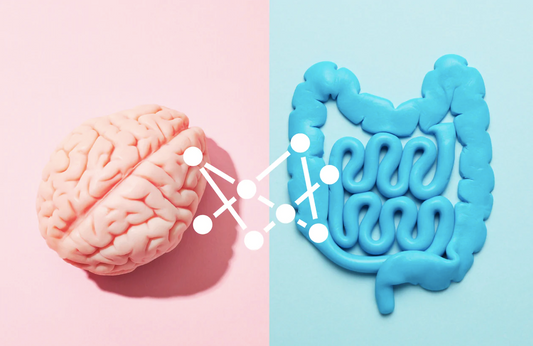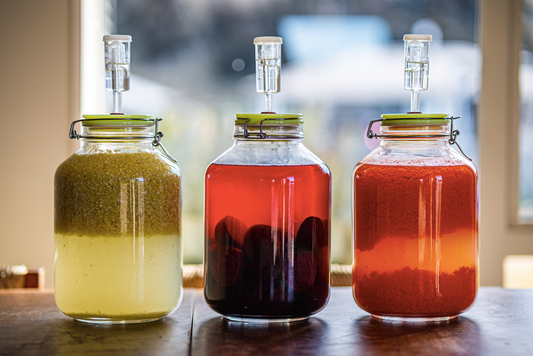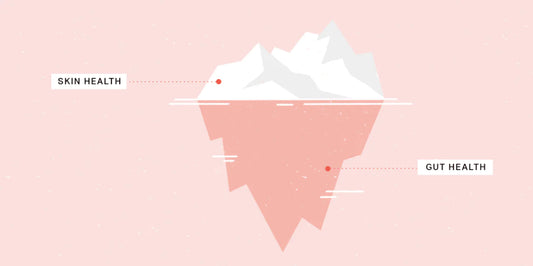Gut Health & Breastfeeding: How Your Microbiome Shapes Your Baby’s Future
The impacts of our gut health seem to be far spreading and ever growing as new research and insights confirm them. We now know that the health of your gut, and more specifically your microbiome, will impact the quality of your breastmilk and therefore the health of your baby.
If you want to set your baby up with the best start possible this is a key area to focus on! We know that their gut microbiome is largely established within the first 1000 days of their life and will then look a similar picture throughout their life. It’s their environmental factors - breastmilk, food, air quality, medications, supplements, sanitation etc that will influence this development.
 If you’re new to the word ‘microbiome’ it encompasses the trillions of organisms (bacteria/yeast/fungi) that live within our intestines. These organisms hold a really important role in your physiology - how your body functions! They do this through communication to your brain, through the production of molecules which can assist detoxification, inflammation, hormone balance…. and through being key immune fighters. Without a healthy microbiome you would be more likely to get sick, have poor mental health and have digestive issues - just to name a few.
If you’re new to the word ‘microbiome’ it encompasses the trillions of organisms (bacteria/yeast/fungi) that live within our intestines. These organisms hold a really important role in your physiology - how your body functions! They do this through communication to your brain, through the production of molecules which can assist detoxification, inflammation, hormone balance…. and through being key immune fighters. Without a healthy microbiome you would be more likely to get sick, have poor mental health and have digestive issues - just to name a few.
‘Feed and Seed’
Breast milk is known to ‘feed and seed’ the baby’s microbiome. Not only does it provide prebiotics (‘feed’) but it also provides probiotics (‘seed’).
Prebiotics:
These are non-digestible carbohydrates that feed beneficial bacteria within the gut and encourage their growth. The baby is born with a small microbiome, developed throughout pregnancy and during delivery, which needs feeding in order to grow, survive and develop in diversity. Without these prebiotics coming in, say in the case of some formulas or a mother with poor gut health, the microbiome is less likely to develop well. Breastmilk is specifically high in the prebiotic human milk oligosaccharides (HMO).
Probiotics:
Breast milk is essentially a probiotic drink! Rich in beneficial microbes which ‘seed’ the good guys into the baby’s gut to increase the levels of bacteria within their microbiome. Interestingly, research has shown that breastfed babies have lower bacterial diversity before 4 months of age compared to formula babies but further research shows this to be beneficial in the case of babies, unlike adults. It also demonstrates that these breastfed babies then have a significant increase in their microbial diversity once food is introduced.
We also see that specifically feeding off the breast increases the transfer of beneficial organisms as opposed to expressing milk and then feeding from a bottle.
The key benefits the baby is going to receive through probiotic and prebiotic rich breast milk are:
-
A robust immune system
-
Prevention or treatment of skin conditions such as eczema
-
Prevention of reflux
-
Prevention of developing allergies
-
Prevention of asthma
-
Long-term reduced risk factor of chronic conditions like diabetes, depression and obesity
Mother’s Gut health
More recent research has demonstrated the impact of mothers' diets during pregnancy and postpartum and the connection to milk quality - specifically in regards to the microbial content. Some research shows a direct impact of positive food choices on the milk microbiome and other research shows that even without the milk microbiome changing the infant's gut can still be positively affected from the mothers’ food choices.

Changing the mother’s diet during pregnancy and lactation can have potentially life long implications for a baby’s health - both positively and negatively.
For example, any level of alcohol consumption was associated with decreased levels of certain HMO’s. It’s these HMO’s that hold a key place in developing the baby’s microbiome.
If the mother has poor gut health this can both affect the baby's microbiome in utero but also can affect the quality of the breast milk. Poor gut health could be characterised by:
-
Gut dysbiosis: unfriendly strains of bacteria within the mothers gut
-
Inflammation in the gut - this could be from processed food, unknown food allergens, chronic stress, a ‘leaky’ gut
-
Low levels of beneficial gut bacteria
This is typically apparent in any symptoms they may experience such as irregular bowel motions, bloating, reflux, pain or poor digestion however the above states could still be present without these symptoms. This highlights the importance of preconception care to ensure your body is in the best state possible to conceive a baby and have a healthy pregnancy.
Benefits of Mum having good gut health
Not only does the baby benefit from Mum having a healthy gut but the Mum also will too. This is applicable throughout pregnancy and in the postpartum period. The key areas we see this in are: energy levels, digestive health, immune support and mood support.
-
Energy: beneficial bacteria produce nutrients within the gut working to mitigate the energy draining demands of pregnancy and post-partum. The gut-brain axis is also important here for boosting mood/motivation and energy levels - with the right bacteria the right signals are sent to the brain to mitigate brain fog and give great mental clarity and mood.
-
Mastitis: if you’ve had mastitis you’ll know the pain and stress it can come with! Building a robust microbiome works to support the immune system and therefore reduce susceptibility to picking up infections such as mastitis. Of course it’s also going to help prevent other bacterial or viral infections which are particularly unwelcome during pregnancy and breastfeeding.
-
Mood swings: it’s the gut-brain axis that is really at play here. We have more communication from the gut to the brain than we do from the brain to the gut - highlighting the massive impact your gut health has on brain function - mood, cognition and emotional processing. The hormonal changes, energy demands and massive lifestyle changes during both pregnancy and breastfeeding can make you more at risk of having an unstable mood. Supporting this with a health microbiome is an effective way to ensure you are sending the right communication to the brain and mitigating any unwanted low moods.
-
Digestive issues: Constipation, reflux/indigestion and bloating are all commonly experienced during pregnancy and breastfeeding. Again, supporting your microbiome and therefore your whole digestive tract is an easy way to prevent these symptoms and have one less thing to worry about.
Practical Steps for Mums to Support Gut & Breastfeeding Health
So what do you need to do!

Clover Ferments here are fantastic as a rich probiotic food source to boost your microbial communities, digestive enzymes and provide additional nutrients. They are easy to take and have been proven in numerous case studies to show beneficial effects for both the mum and the baby. While you can take these throughout pregnancy it’s never too late to start! If you are already breastfeeding, I would encourage you to get onto these straight away to improve the quality of your breastmilk and the outcomes for your baby.
On top of this, the following dietary and lifestyle factors are going to be really important:
-
Eating a whole foods diet rich in plant matter, a diversity of colour and rich in protein. Aim for most of your diet to come from plant matter: veggies, greens, fruit, grains, berries, legumes and complement this with good quality meat and dairy (if tolerated).
-
Avoid foods like sugar, flour, alcohol, foods containing preservatives or additives that are known to impact the microbiome negatively.
-
Remain hydrated! This is key to keeping your gut flowing. A stagnant/constipated gut creates a breeding ground for the wrong kind of bacteria to grow. Aim to drink 2L per day when pregnant and 3+L per day when breastfeeding.
-
Remain active. Again, this is really important to prevent a stagnant gut and keep things moving along.
While all of these things are particularly important if you have known gut issues, they are still really important if you don’t have any concerns in this area but want to optimise your health and your baby’s health and prevent any concerns arising. I think the Clover Ferments tonics are such a fantastic tool as they are one easy thing you can stick to daily regardless of the busyness of your schedule and perhaps not always managing to achieve all of the above points daily - they are fantastic treatment and prevention.
Enjoy this previous time of life with your growing baby or newborn! X
Grace Mortimer

Grace Mortimer - Head Clinical Nutritionist
Pheno Nutrition
https://www.phenonutrition.com/
-
BSc Neuroscience
-
dipGrad Human Nutrition
-
HPN2 Clinical Nutrition
Research:
- https://www.nature.com/
- https://www.sciencedirect.com/
- https://www.broadinstitute.
- https://www.ohsu.edu/school-of-medicine/moore-institute/breastfeeding-and-microbiome




